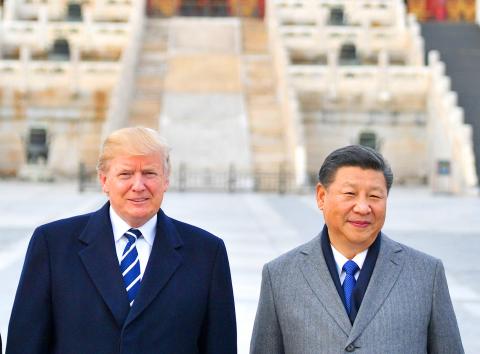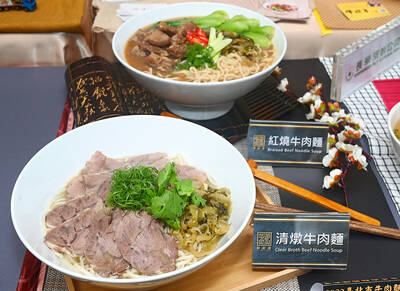During a meeting last week between US President Donald Trump and Chinese President Xi Jinping, the two leaders hammered out a consensus to enable a temporary truce to the US-China trade war. At first it appeared Trump had given Xi face-saving concessions, yet in reality it was the US side that has not only gained face but also won a substantive victory. Beijing has made the greatest number of concessions, while Washington only slightly softened its stance, to give the Chinese side some breathing space. In addition, the US has given China an extension of 90 days to complete the trade negotiations: a timeframe that coincides with the Chinese Communist Party’s annual Chinese National People’s Congress and Chinese People’s Political Consultative Conference. For Beijing, this next stage in the negotiations is fraught with danger, especially since the country’s domestic economic problems are beginning to rise to the surface. It is therefore Xi who is under the greatest amount of pressure to strike a deal.
Since the US-China trade war kicked off, the US has placed customs tariffs on Chinese products worth US$250 billion, accounting for approximately half of China’s exports to the US. Beijing has retaliated by imposing tariffs on US$110 billion worth of US products. However, the Chinese economy has clearly sustained a greater blow. The country is facing a raft of problems including an economic slowdown, credit defaults, sluggish consumer spending and a housing bubble. If the trade war continues to escalate, production lines will rapidly withdraw from China, and this could unleash a wave of redundancies. This would strike a hammer blow to China’s economy and society, and would also pose a serious challenge to Xi’s leadership.
Despite the progress made at last week’s meeting, judging from the briefings given by either side after the event, it is clear that there are still a number of unresolved differences. While the US agreed to defer raising tariffs to 25 percent on US$200 billion of Chinese goods — and China in turn agreed to expand its purchases of US goods — there remains a 90-day deadline for the completion of negotiations, while a number of other issues were left unresolved. This includes implementation of structural reforms including protection of intellectual property rights, expanding purchases of [US] goods and individual cases such as the acquisition of NXP by Qualcomm. The two sides agreed to disagree on these and other areas, thereby foreshadowing a rekindling of the trade war in the near future.

Photo: AFP
照片:法新社
From Trump’s perspective, due to the current strong recovery of the US economy, agreeing to defer the further raising of tariffs in exchange for Chinese promises to expand purchases of American goods and opening up its markets seems like an effective opening gambit. However, future negotiations will be tempered by the hawkish, anti-China sentiment in Washington.
From Xi’s perspective, the trade war is already hurting China’s economy, and although a temporary respite has been granted, the challenge for Xi is how to respond to US demands to implement structural reform, in addition to seeing off a growing restlessness and opposition to his policies at home. It seems that the US-China trade war is a fire that will prove difficult to extinguish.
(Translated by Edward Jones, Taipei Times)
「川習會」上週達成貿易戰休兵共識,表面上川普給足了習近平面子,實際上卻是美國面子及裡子都贏了,中國明顯讓步更多,美國只是態度稍微軟化,讓中國得以喘口氣。而且,美方提出九十天內完成協商,期間適逢中國舉辦人大及政協「兩會」,後續談判平添更多風險,加上中國經濟問題陸續浮上檯面,壓力大多落在習近平這邊。
美中貿易戰開打以來,美國已對兩千五百億美元中國產品加徵關稅,約占中國銷美貨品的一半,中國則對一千一百億美元美國產品加徵關稅做為報復。然而,中國受到的衝擊明顯更大,目前中國面臨經濟趨緩、債務違約、消費降級、房市泡沫等問題,若貿易戰持續升溫,生產線加速撤離中國,可能爆發大規模失業潮,不僅對中國經濟及社會是一記重擊,更將嚴重挑戰習近平的領導威信。
這次「川習會」雖有所進展,但從美中事後發出的聲明,可以看出雙方仍有不少歧異。儘管美方同意暫緩將兩千億美元中國產品關稅調高至百分之二十五,中國則同意擴大採購美國產品;但對於九十天協商期限、智慧財產權保護等結構性改革、擴大採購的品項、高通收購恩智浦案等,雙方會後「各自表述」,也為美中重燃貿易戰火埋下伏筆。
對川普而言,目前美國經濟強勁復甦,美方同意暫緩提高關稅,換取中國大規模採購及開放市場等承諾,抗衡中國策略初具成效,只是未來談判須顧及鷹派的反中情緒。
而對習近平而言,貿易戰已傷及中國經濟,現在中國經濟得以喘口氣,但未來如何面對美方要求結構性改革的壓力,以及國內蠢蠢欲動的反對勢力,將是相當大的挑戰。因此,美中貿易戰想要真的停火,難度極高。
(自由時報記者鄭琪芳)
Housing bubble
Follow up
讀後練習
A housing bubble — also called a real estate bubble or property bubble — occurs when property prices are pushed up following an increase in demand. Speculators then enter the market, further inflating prices to unsustainably high levels. The bubble bursts when demand decreases while the supply continues to increase, resulting in a sudden correction in prices.
After the bursting of the dotcom bubble in 2000, many US investors abandoned the stock market for the perceived safety of bricks and mortar. Investors piled into property, pushing up prices. Over the next half decade a homeownership mania took hold, pushing prices sky high. As the bull market continued, houses began to be purchased by investors as purely speculative investments.
By 2007, increased foreclosure rates among US homeowners led to a crisis in the US housing market and investors, deeming the risk to be too high, either stayed away or pulled out of property altogether. Demand slumped as a construction overhang continued to push more property onto the market. As severe oversupply took hold, the bubble burst dramatically and property prices declined as much as 40 percent in some areas of the country.
(Edward Jones, Taipei Times)

A: In its latest annual travel guide, Bloomberg recommended two restaurants in Taipei: Golden Pig barbeque from South Korea and two-Michelin-star restaurant A. B: Also, tourists should definitely try Taiwanese cuisine while they’re here. Mountain & Sea House, Shin Yeh Taiwanese Cuisine, and Fujin Tree Taiwanese Cuisine & Champagne are good options. A: For local snacks, Fu Hang Soy Milk, Fu-Ba-Wang Pigs’ Knuckles Restaurant, and Wang Ji Rice Dumplings are all very popular. B: And the gold medalists of the 2025 Taipei International Beef Noodle Festival — Yun Shui Kitchen, The Howard Plaza Hotel Taipei, and Come N’ Eat

A: Bloomberg just released its annual travel guide, titled “25 Best Places to Travel in 2026.” What were the best Asian destinations? B: There were actually six Asian hotspots: Taiwan’s Taipei, Malaysia’s Penang, Kazakhstan’s Almaty, Indonesia’s Rote Island, India’s Tiger Reserves, and Oman. A: With its mix of traditional food and modern cuisine, Taipei has become a rising food capital in Asia. B: As Bloomberg reported, “Taiwan is a place that bubbles up in culinary conversation because of its famed beverage, bubble tea, and its early adoption of modern night markets.” A: And Din Tai Fung has now

Facing relentless flooding and rising expenses, Dumble Farm in England has stopped selling milk and started an unexpected but therapeutic venture: cow cuddles. In 2022, the owners sold most of their dairy cows and began letting visitors spend time brushing, petting, and even hugging specially trained Highland cows for 95 pounds per session. This unusual shift reflects the rise of the so-called healing economy, a sector where animal-assisted experiences are marketed as emotional remedies for stress and burnout. While dogs and cats remain the most common therapy animals, cows are gaining popularity for their calm nature. At Dumble Farm, only cows that

For many introverts, shy individuals and people with social anxiety, mingling at parties is often draining or arouses uncomfortable emotions. The internal debate about whether or not to attend large get-togethers can get especially intense during the holiday season, a time when many workplaces celebrate with cocktail hours, gift exchanges and other forms of organized fun. “Some people are just not party people,” City University of New York social work professor Laura MacLeod said. “With a workplace holiday party, there’s a pressure to be very happy and excited. It’s the end of the year, it’s the holidays, we’re all feeling grand.